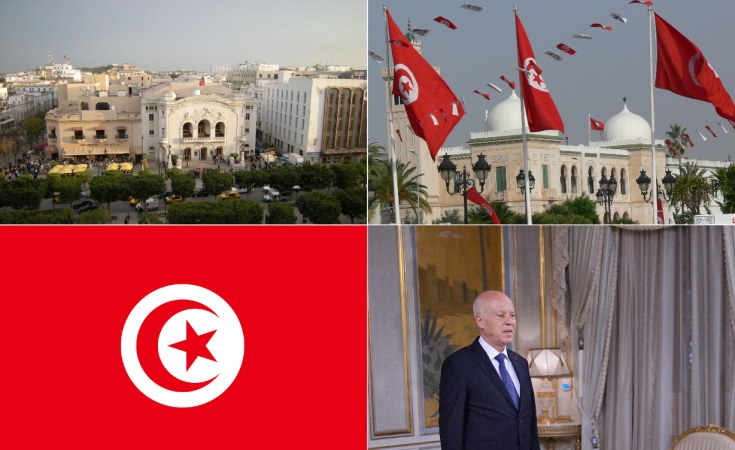Legislative elections are taking place on December 17 but observers doubt that there will be any major changes given the president's tightening grip on power. As the economic situation deteriorates, voters are gloomy.
In the run-up to Saturday's elections, the atmosphere on the streets of the Tunisian capital Tunis is anything but hopeful.
"I will not participate in the poll because there is no credibility or transparency," Lotfi Belhadi, a civil servant in Tunis, told DW, adding that "the elections are a sham, and the parliament will be a body without powers."
English teacher Soumaya Salhi also said that she would not vote: "My participation would normalize an illegal and undemocratic situation," she told DW. "What's the point of electing deputies who can neither make their own decisions nor have the power to hold the president and members of the government accountable?"
Her words underline the deterioration of public opinion towards President Kais Saied and his political overhaul. In July 2021, the former law professor who had become president just two years earlier, suspended the elected parliament and dismissed Prime Minister Hichem Mechichi.
In February, Saied suspended the country's Supreme Judicial Council, and a month later he dissolved the parliament completely.
In July, voters approved a new constitution that extends presidential rights in Tunisia even further.
The country's electoral law was changed in September and will apply to the upcoming elections. There are now 161 electoral districts rather than 217 and for the first time, people will be voting for individual candidates rather than party lists.
However, public funding of campaigns has been banned and each candidate has had to provide 400 endorsements. Gender parity, which was introduced in 2016 as one of the key demands by the Arab revolution in 2011, has been abolished.
Moreover, international members of the press are banned from reporting on individual candidates.
According to Tunisia's Independent High Authority for Elections, or IESE, five parties and around 1,500 independent, mostly rather unknown figures, were admitted to join the race. But 12 parties, including the influential Islamist Ennahda Party, decided to boycott the elections.
"We cannot place our hands in the hands of a person who has destroyed state institutions," Ezzeddin Hazgui, a founding member of the opposition National Salvation Front coalition, which is boycotting the election, told DW. "If the boycott was in a democratic system, then it would be wrong, but we are facing a coup," he said.
"For President Saied, it's irrelevant whether the [Tunisian] people recognize the elections or not," Sami Hamdi, managing director of the global risk and intelligence company International Interest in London, told DW. "There's nobody who believes that there is actually a democratic process happening in Tunisia."
Hamdi said that the president was hoping to remove all remaining legitimacy from the parliament that he dissolved and to have the international community recognize the legislative elections. This could pave the way for the much-needed financial support from abroad, as the requirements for funding by the International Monetary Fund (IMF) have a history of causing trouble between Saied and the powerful General Labour Union (UGTT) in Tunisia.
Worsening economy
The elections come as the economic situation in Tunisia is particularly dire. According to the country's National Institute of Statistics, inflation is currently close to 10%, a record high. The COVID-19 pandemic and the consequences of Russia's attack on Ukraine have led to massive increases in the price of wheat and other imports.
However, previous agreements with the IMF failed after the UGTT with its one million members on their side and its proven ability to paralyze the economy with strikes, didn't agree to the IMF's demand to cut public wages.
In a new bid, Saied and the IMF reached another preliminary agreement in mid-October on a $1.9 billion (€1.79 billion) tranche. However, in turn, the UGTT reiterated at their annual assembly in early December, that they will "not abide by secret agreements the government has with the [IMF], and the workers will stand up to it," according to a statement.
Moreover, this sum is about half of the $4 billion (€3.76 billion) the country initially requested and is not seen as enough to bail out the country's economy.
Worries and fear
"One of the things that people are waiting to see is if the election will be the opportunity for some really concerted economic planning and policymaking," Anthony Dworkin, senior policy fellow at the European Council on Foreign Relations, told DW. "Unfortunately, there's nothing inside the record so far that suggests that Kais Saied is going to take the opportunity to do that."
Instead, Dworkin said that "what we've seen up to now is that he's built a system in an attempt to really close down the space for independent actors." There's concern, he said, that after the elections the president would "move forward with pressure on other elements, "including civil society, freedom of speech and also on political parties."
But Abdelmajid Tayeb, a retiree in Tunis, refuses to give up hope. He told DW that he was planning to cast his vote on Saturday.
"We hope for the return of constitutional institutions, and for parliament to do its duty and introduce amendments to laws."
Edited by: Anne Thomas; Rob Mudge


